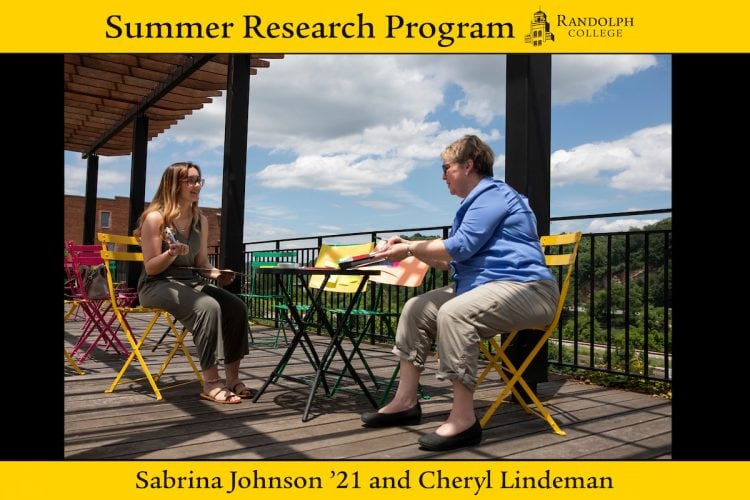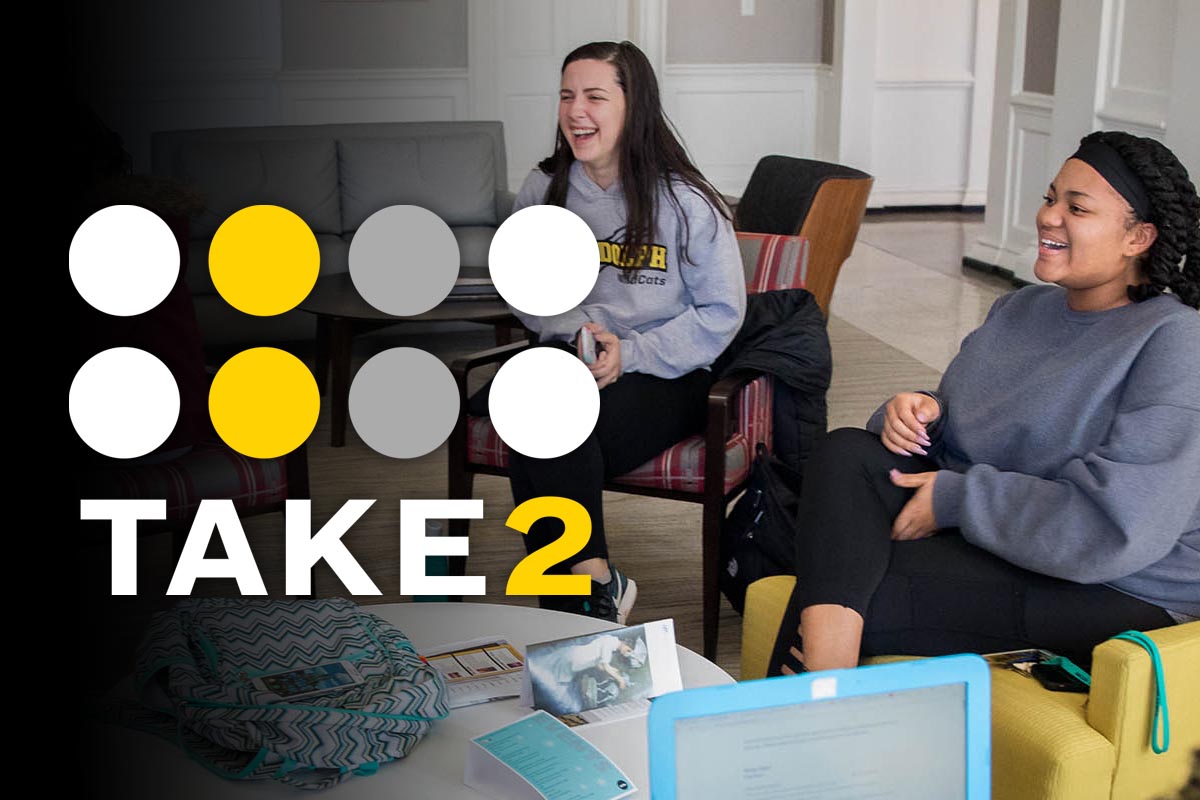Deeper learning: Summer Research looks at how teachers learn
This story is part of an ongoing series featuring the work of faculty and students participating in Randolph’s Summer Research Program, which is being held virtually this year due to COVID-19.

Sabrina Johnson ’21 and education professor Cheryl Lindeman discuss their summer research project in downtown Lynchburg.
Sabrina Johnson ’21 doesn’t like math. But as an elementary education major, she knows she can’t avoid it forever.
“It’s not like I could just skip a subject,” said Johnson, who began thinking about her aversion more seriously after reading an article about other teachers’ insecurities about it.
“In most cases, you’re going to end up teaching it at some point. So how do those teachers deal with struggles in their own learning? How, as a teacher, am I going to be able to teach students in a productive way?”
Those questions inspired the summer research project she’s collaborating on with education professor Cheryl Lindeman.
Together, they are looking at how elementary math and science teachers create their own learning pathways through professional development activities, and how curiosity is integrated into their teaching philosophies. Their goal is to identify strategies and content knowledge teachers have learned during their careers.
“I wanted to know how teachers know what they need to know when they get into a classroom, or what preservice teachers should anticipate when they get into a classroom,” Johnson explained.
Lindeman said the work is pretty ambitious but targets a unique need.
“In the last two years, federal funding for Math Science Partnerships that provided a stream of funding for STEM professional development has dried up,” Lindeman said. “There is no more, so it really left the states and the divisions to come up with their own professional development in math and science. That kind of left everybody scrambling.”
Their original plan was to invite teachers to one of three lunches, where they’d ask them a series of carefully curated questions. But because of COVID-19, the Summer Research Program (SRP) moved online—and so did their project.
They started with a Google forum survey that was sent to teachers who have taught math and/or science in the last three years—most located in the Central Virginia area—and gave them the option to then participate in a virtual chat with Johnson and Lindeman.
“A lot of our questions focus on professional development,” Johnson said. “How they seek it out, where they’re going for it. Is it funded by the school? Is it required for licensure reasons?
“All the responses we’ve had have been really helpful and insightful. We asked about professional development advice, and the answers have been really eye-opening.”
They’re also talking to teachers about what Lindeman called the real essence of their work, the concept of deeper learning.
“It has been a term used in education jargon over the years, but the definition of it is a little more clear now,” she said.
For the purposes of their study, Johnson and Lindeman are using the Darling-Hammond and Oakes (2019) description defining it as experiences that equip students with the skills necessary to find, analyze, and apply knowledge and prepare them for college, work, civic participation, and lifelong learning.
“We shared that with the teachers in the forum,” Lindeman said. “We discussed it.”
They also found a way to incorporate Lindeman’s own research about curiosity and the classroom, and how it can impact teaching styles, into the study. Using an inventory of traits curious people exhibit that was created by a researcher at George Mason University, Lindeman and Johnson asked teachers to select which ones described their approaches to teaching.
“I’ve had questions about curiosity and looking at where the evidence is of curiosity in the traditional classroom,” Lindeman said. “We’re born with it, we kind of naturally are curious, and what happens is it can be stifled.”
When it comes to the virtual chats, Lindeman said they’re being intentional about groupings.
“We found it was better to start with a small group, and we kind of paired them with a veteran teacher and a new teacher, so there was some dialogue there. That was the other value add. There are a few teachers that can’t meet, so we’re giving them the option to email back the form questions.”
The pair even wound up offering up a bit of professional development themselves.
Lindeman said during one of their sessions, they ended up teaching some of the teachers about a whiteboard feature that’s available on Zoom.
“They love it, that we could give them something back,” she said. “They wanted to know how it worked and what they could do. So they were chatting with each other, and it really made it fun, because that’s what teachers do.”
Tags: Cheryl Lindeman, education, elementary education, Sabrina Johnson, student faculty research, summer research, summer research 2020
